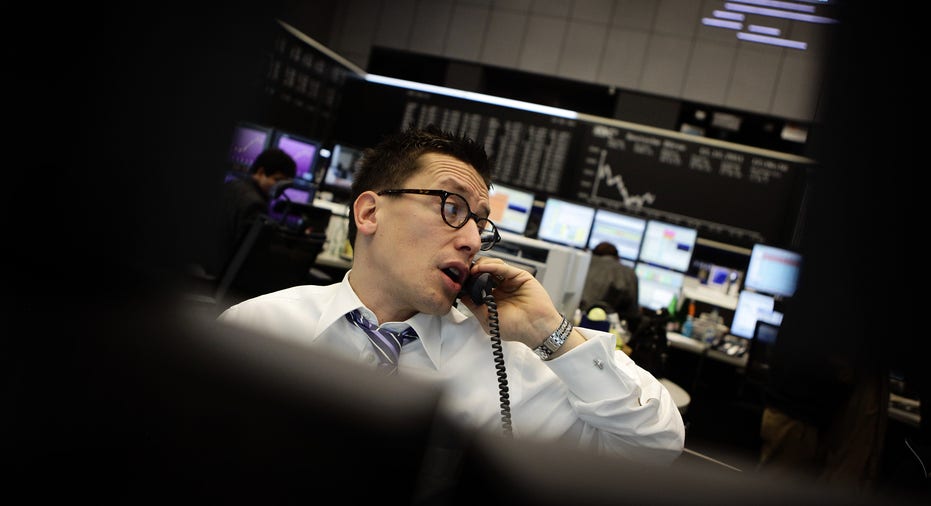European Shares Fall Amid Political Uncertainty

Shares, oil and other riskier assets slumped on Monday after elections in Greece and France saw incumbents defeated, raising fears the collective response to the euro zone debt crisis seen as crucial to holding the currency bloc together is fracturing.
MSCI's broadest index of Asia-Pacific shares outside Japan slid 2.3 percent to a three-month low, on course for its worst daily fall in five months, with the materials sector and growth-sensitive sectors such as technology leading the declines.
European shares will likely sink at the open, with financial spreadbetters predicting that major European markets would open down over 2 percent. U.S. stock futures were down 1 percent.
The results threatened the fragile political consensus that has kept Europe's currency bloc intact through more than two years of crisis and raised pressure on Germany to take a more growth-oriented approach to the crisis.
"There are great fears that the new government in Greece will end austerity measures and that will lead to a disorderly default, and that has led to a sell-off across all risk markets," said Ben Le Brun, a market analyst with OptionsXpress in Sydney.
The outcome of the Greek election was having a much bigger impact than French election result, market players said.
Greece's two main pro-bailout parties failed to win a majority in parliament that would allow them to form a coalition, putting at risk the policies that have shielded Athens from bankruptcy and a euro exit.
"The issue is that in Greece the outcome raises the level of uncertainty a lot, because it's not clear who can form the government or in fact how long they will last, and what their attitude to the current agreements that the Greek government had reached would be," said Richard Yetsenga, Head of Global Markets at ANZ Research.
"The French outcome was as expected. The markets have already shifted to a view that austerity on its own wasn't the right policy mix and that other things needed to be considered."
In France, Socialist Francois Hollande swept to presidential election victory, ousting incumbent Nicolas Sarkozy who had played a key role in structuring bailout schemes for indebted euro zone members and pushed for strict fiscal policies aimed at managing huge debts, working closely with German Chancellor Angela Merkel.
Amid scepticism that a similar tie could be forged, Merkel invited Hollande to visit Berlin as soon he could for a meeting that would set the groundwork for a consensus on growth policies vital to the euro zone's future health.
"Austerity will not work to solve Europe's debt crisis. However, shifting austerity to higher earners and business will accelerate the debt crisis," said Jeff Sica, president of SICA Wealth Management, which manages more than $1 billion in client assets, real estate and private equity holdings.
"The Merkel/Hollande initiative will never materialise due to Hollande and Merkel being polar opposites with no chance to agree on anything," Sica said.
US DATA DENTS SENTIMENT
Much weaker-than-expected U.S. jobs data on Friday added to concerns, as it raised the biggest question mark yet about the prospects of growth in the world's largest economy.
Mitsuru Sahara, chief FX manager at Bank of Tokyo Mitsubishi-UFJ in Tokyo, said the euro would remain pressured due to a bearish technical outlook, possibly moving towards the year-low near $1.26, while waning optimism about the U.S. economy could further weigh on investors' risk appetite.
"Markets have been rallying so far this year on expectations about the solid U.S. economy, and if such views falter, it could snap uptrends in markets," he said, adding that a series of speeches scheduled this week by Federal Reserve officials may shed light on the Fed's latest view about U.S. growth.
Chinese data due later this week, including trade balance figures, consumer prices and industrial output, was also in focus. Weaker data from the world's second-largest economy could underscore how vulnerable the global growth outlook is and further dent investor risk appetite.
Wall Street posted its biggest weekly fall this year after U.S. jobs data showed 115,000 workers were hired in April, well below forecasts of 170,000.
RISK OFF, SAFETY ON
U.S. crude futures dropped more than $3 a barrel while Brent crude fell more than $2.50 after the election results and U.S. jobs data. U.S. crude was last down 1.5 percent at $97.04 while Brent was down 0.7 percent at $112.42.
The Australian dollar, sensitive to commodities demand and hence growth expectations, fell to a four-month low near $1.0110 on Monday while the euro fell to its lowest since Jan. 25 at $1.2955.
Risk aversion hit Asian credit markets, pushing the spread on the iTraxx Asia ex-Japan investment-grade index wider by 11 basis points, but safe-haven assets such as government debt and the yen rose.
The yen's strength hit Japanese exporters, which along with financials, sent the Nikkei stock average tanking as much as 2.9 percent to a three-month low.
The dollar eased 0.2 percent at 79.77 yen, after the yen firmed against the euro to its highest level since mid-February at 103.24 yen.
The yield on the benchmark 10-year Japanese government bond slipped to 0.865 percent, its lowest level since October 2010, while 10-year Treasury yields slumped to 1.83 percent from 1.88 percent on Friday.
The dollar rose against a basket of major currencies to a three-week high, making dollar-priced commodities less attractive to buyers holding other currencies and weighing on spot gold which fell 0.3 percent to $1,637.56 an ounce.



















